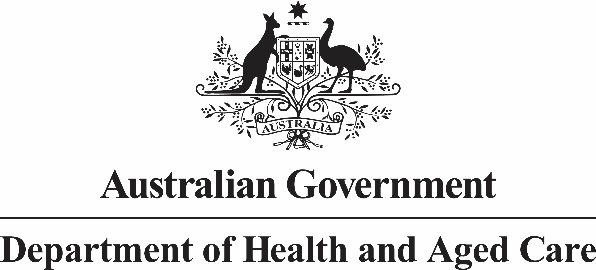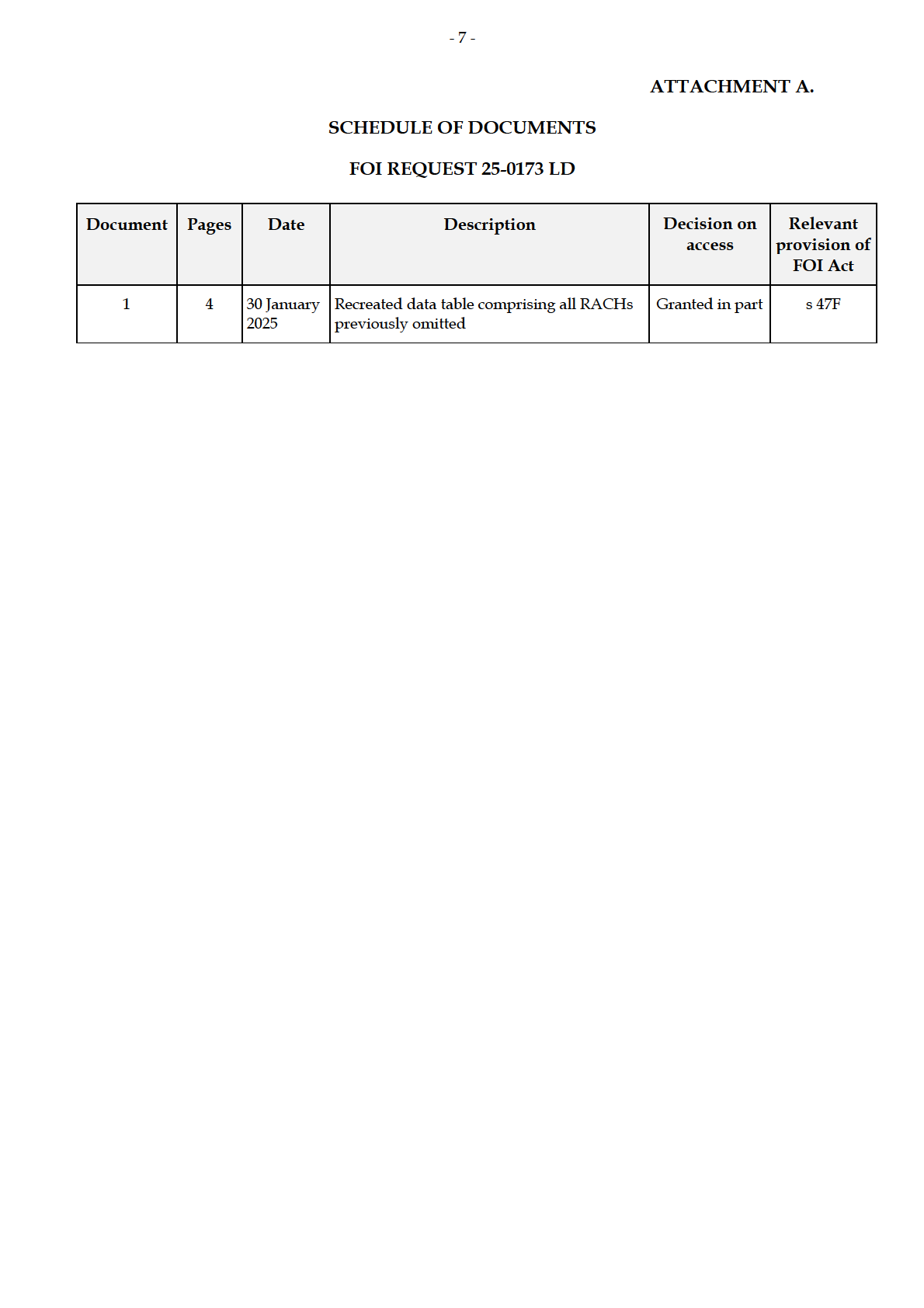
FOI reference: FOI 25-0173 LD
Andrew
Right to Know
By email: xxxxxxxxxxxxxxxxxxxxxxxxxx@xxxxxxxxxxx.xxx.xx
Dear Andrew
Decision on your Freedom of Information Request
I refer to your information access request of 19 December 2024 made to the Department
of Health and Aged Care (the department) under the
Freedom of Information Act 1982
(Cth) (FOI Act). In your request, you sought access to:
Could I please request access to the full list of aged care facilities in this document:
https://www.health.gov.au/sites/default/files/documents/2020/12/covid-19-outbreaks-
in-australian-residential-aged-care-facilities-30-december-2020-covid-19-outbreaks-
in-australian-residential-aged-care-facilities-30-december-2020.pdf
In page 1 of the document, it is noted that 218 facilities had COVID-19 outbreaks,
however, in Appendix 1, only 129 facilities are listed. Could I please request access to
the names and data for the remaining facilities?
I am authorised under subsection 23(1) of the FOI Act to make decisions in relation to
Freedom of Information requests. I am writing to notify you of my decision on your
access request.
Extension of time to process request
On 19 December 2024, the department contacted you by email, acknowledging your
request and seeking a 14-calendar day extension of time under section 15AA of the
FOI Act to allow it to process your FOI request.
On 23 December 2024, you responded to the department agreeing to the extension of
time request. As a result, the statutory date for your FOI access request was extended
to 1 February 2025 (OAIC reference: RQ24/06009).
On 22 January 2025, the department wrote to you under section 15AA of the FOI Act
seeking a 7-calendar day extension of time to allow it to process your FOI request.
GPO Box 9848 Canberra ACT 2601
- www.health.gov.au
- 2 -
On the same date, you responded to the department agreeing to the extension of time
request. As a result, the statutory date for your FOI access request was extended to
10 February 2025 (RQ25/00425).
Interpretation of the scope of the request
The department would like to clarify that the list in Appendix 1 of the snapshot
referenced in your request does not contain a list of 129 facilities
. Appendix 1 is a list
of 129 outbreaks that have occurred at a residential aged care home (RACH) with more
than one staff or resident COVID-19 case across all outbreaks. Therefore, the list may
contain some duplicate RACHs in the event where multiple outbreaks occurred.
You have requested access to data in relation to 218 facilities which have had COVID-
19 outbreaks. As Appendix 1 is a list of outbreaks, we have interpretated this to
compare to the ‘
Total number of outbreaks at residential aged care facilities’ number (row 6
in Table 1 of the report), which is 224. Therefore, there are 95 outbreaks that were
omitted from the report as they did not meet the reporting business rules at the time.
In meeting this request, the department is providing a list of the 95 RACHs that were
not published in the 30 December 2020 ‘
COVID-19 outbreaks in residential aged care
facilities’ report. The reason for these RACHs not being included in the report is
because Appendix 1 only contained RACHs with two or more COVID-19 cases (staff
or residents) across all outbreaks.
The department’s current privacy rules
In September 2022, the department implemented a policy to suppress data relating to
low COVID-19 case and death figures to protect the privacy of RACH residents and
staff. This policy remains in place, with reports from September 2022 clearly stating
the following:
“Where a RACH is reporting less than six resident or staff cases or less than
six deaths, data has been suppressed to protect the privacy of affected individuals.”
Reasonable searches
The department has conducted reasonable searches for documents in scope of your
request. As per the FOI Guidelines [at 3.89], these searches were undertaken with
reference to:
• the subject matter of your request
• the department’s current and past file management systems
• the department’s record management systems
• the individuals within the department with knowledge of the subject matter of
the documents, or who could assist with location of documents
• the age of the documents.
I am satisfied that the searches undertaken were both thorough and reasonable in the
context of the scope of your request, the resources of the department, and the
requirements of the FOI Act and FOI Guidelines.
- 3 -
Caveats to document produced
The information within the document is provided on the following basis:
• All data is as of 30 December 2020.
• The document was recreated from the original data source used for the report
on 30 December 2020.
• This information pre-dates current reporting systems and business rules used
by the department.
• Due to the department’s current privacy policies, the associated case and death
data have not been included.
Decision on access
You have requested access to information that is held in the department’s computer
systems.
Pursuant to section 17 of the FOI Act, the department has used its computer systems
to produce one document that contains the information you are seeking to access.
I have decided to grant access to one document in full, which contains a list of the 95
RACHS excluded from the previous report.
Section 47F of the FOI Act provides that a document is conditionally exempt if its
disclosure would involve the unreasonable disclosure of personal information about
any person (including a deceased person).
Personal Information
Personal information has the same meaning as in the Privacy Act. Specifically,
section 6 of the Privacy Act provides that
personal information means information or an
opinion about an identified individual, or an individual who is reasonably identifiable
whether the information or opinion is true or not; and whether the information or
opinion is recorded in a material form or not.
Paragraph 6.123 of the FOI Guidelines states that for particular information to be
personal information, an individual must be identified or reasonably identifiable:
• whether the information is true or not, and
• whether the information or opinion is recorded in a material form or not.
I am satisfied that due to the number associated with the breakouts and death cases,
that the information is personal information.
Unreasonable Disclosure of Personal Information
Subsection 47F(2) of the FOI Act provides that in determining whether the disclosure
would involve the unreasonable disclosure of personal information, I must have
regard to the following matters:
- 4 -
(a) the extent to which the information is well known
(b) whether the person to whom the information relates is known to be (or to have
been) associated with the matters dealt with in the document
(c) the availability of the information from publicly accessible sources
(d) any other matters that the agency or Minister considers relevant.
Paragraph 6.133 of the FOI Guidelines states that:
The personal privacy conditional exemption is designed to prevent the unreasonable
invasion of third parties’ privacy. The test of ‘unreasonableness’ implies a need to
balance the public interest in disclosure of government-held information and the private
interest in the privacy of individuals. The test does not, however, amount to the public
interest test of s 11A(5), which follows later in the decision making process. It is possible
that the decision maker may need to consider one or more factors twice, once to
determine if a projected effect is unreasonable and again when assessing the public
interest balance.
I note that the AAT, in
Re Chandra and Minister for Immigration and Ethnic Affairs [1984]
AATA 437 at paragraph 51-52, stated that:
... whether a disclosure is ‘unreasonable’ requires … a consideration of all the
circumstances, including the nature of the information that would be disclosed, the
circumstances in which the information was obtained, the likelihood of the information
being information that the person concerned would not wish to have disclosed without
consent, and whether the information has any current relevance … it is also necessary in
my view to take into consideration the public interest recognised by the Act in the
disclosure of information … and to weigh that interest in the balance against the public
interest in protecting the personal privacy of a third party ...
Paragraphs 6.137 and 6.138 of the FOI Guidelines state:
6.137
Key factors for determining whether disclosure is unreasonable include:
• the author of the document is identifiable
• the documents contain third party personal information
• release of the documents would cause stress on the third party, and
• no public purpose would be achieved through release.
6.138
As discussed in s 47F IC review decision of ‘FG’ and National Archives of
Australia [2015] AICmr 26, other factors considered to be relevant include:
• the nature, age and current relevance of the information
• any detriment that disclosure may cause to the person to whom the
information relates
• any opposition to disclosure expressed or likely to be held by that person
• the circumstances of an agency’s or minister’s collection and use of the
information
• the fact that the FOI Act does not control or restrict any subsequent use or
dissemination of information released under the FOI Act
- 5 -
• any submission an FOI applicant chooses to make in support of their
application as to their reasons for seeking access and their intended or likely
use or dissemination of the information, and
• whether disclosure of the information might advance the public interest in
government transparency and integrity
I am satisfied that the disclosure of personal information, numbers of
individuals/deaths would, in the circumstances, constitute an unreasonable
disclosure of personal information as it could allow identification of individuals. In
addition, the FOI Act does not control or restrict any subsequent use or dissemination
of information released under the FOI Act.
I have considered that the disclosure of the information would not inform debate,
promote effective oversight of public expenditure or allow you access to your own
personal information.
I have considered that if the department produced this data it could reasonably be
expected to prejudice the protection of the relevant individuals’ right to personal
privacy, which would be contrary to the objects of the
Privacy Act 1988 and therefore
against the public interest.
I have not taken into account any of the irrelevant factors set out in subsection 11B(4)
of the FOI Act, which are:
(a) access to the document could result in embarrassment to the
Commonwealth Government, or cause a loss of confidence in the
Commonwealth Government;
(b) access to the document could result in any person misinterpreting or
misunderstanding the document;
(c) the author of the document was (or is) of high seniority in the agency to
which the request for access to the document was made;
(d) access to the document could result in confusion or unnecessary debate.
For the reasons set out above, after weighing all public interest factors for and against
disclosure, I have decided that, on balance, producing the information would be
contrary to the public interest. I am satisfied that the benefit to the public resulting
from disclosure is outweighed by the benefit to the public of withholding the
information. I have therefore not produced data on the associated COVID-19 cases and
deaths.
A schedule setting out the document relevant to your request, with my decision in
relation to this document, is at
ATTACHMENT A.
Legislative provisions
The FOI Act, including the provisions referred to in my decision, is available on the
Federal Register of Legislation website: www.legislation.gov.au/Series/C2004A02562.

- 6 -
The
Privacy Act 1988 (Cth) (Privacy Act), can also be accessed from the Federal
Register of Legislation website here: www.legislation.gov.au/Series/C2004A03712.
Your review rights
I have set out your review rights at
ATTACHMENT B.
Publication
Where I have decided to release documents to you, the department may also publish
the released material on its Disclosure Log, as required by section 11C of the FOI Act.
The department will not publish personal or business affairs information where it
would be unreasonable to do so.
For your reference the department’s Disclosure Log can be found at:
www.health.gov.au/resources/foi-disclosure-log.
Contacts
If you require clarification of any matters discussed in this letter you can contact the
FOI Section on (02) 6289 1666 or at xxx@xxxxxx.xxx.xx.
Yours sincerely
R Box
Assistant Secretary
Emergency Preparedness and Response Branch
7 February 2025

- 8 -
ATTACHMENT B.
YOUR REVIEW RIGHTS
If you are dissatisfied with my decision, you may apply for a review.
Internal review
You can request internal review within 30 days of you receiving this decision. An
internal review will be conducted by a different officer from the original decision
maker.
No particular form is required to apply for review although it will assist your case to
set out the grounds on which you believe that the original decision should be changed.
Applications for internal review can be made by:
Email:
xxx@xxxxxx.xxx.xx
Mail:
FOI Unit (MDP 516)
Department of Health and Aged Care
GPO Box 9848
CANBERRA ACT 2601
If you choose to seek an internal review, you will also have a right to apply for
Information Commissioner review (IC review) of the internal review decision once it
has been provided to you.
Information Commissioner review or complaint
You have the right to seek Information Commissioner (IC) review of this decision. For
FOI applicants, an application for IC review must be made in writing within 60 days
of the decision. For third parties who object to disclosure of their information, an
application for IC review must be made in writing within 30 days of the decision.
If you are not satisfied with the way we have handled your FOI request, you can lodge
a complaint with the OAIC. However, the OAIC suggests that complaints are made to
the agency in the first instance.
While there is no particular form required to make a complaint to the OAIC, the
complaint should be in writing and set out the reasons for why you are dissatisfied
with the way your request was processed. It should also identify the Department of
Health and Aged Care as the agency about which you are complaining.
You can make an IC review application or make an FOI complaint in one of the
following ways:
• online at www.oaic.gov.au/freedom-of-information/reviews-and-
complaints/
• via email to xxxxx@xxxx.xxx.xx
• by mail to GPO Box 5218 Sydney NSW 2001, or
• by fax to 02 9284 9666.
- 9 -
More information about the Information Commissioner reviews and complaints is
available on the OAIC website here: www.oaic.gov.au/freedom-of-information/foi-
review-process.
Complaint
If you are dissatisfied with action taken by the department, you may also make a
complaint directly to the department.
Complaints to the department are covered by the department’s privacy policy. A form
for lodging a complaint directly to the department is available on the department’s
website here: www.health.gov.au/about-us/contact-us/complaints


